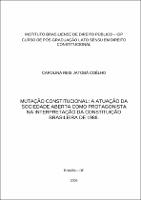Use este identificador para citar ou linkar para este item:
https://repositorio.idp.edu.br//handle/123456789/4388| Título: | Mutação constitucional: a atuação da sociedade aberta como protagonista na interpretação da constituição brasileira de 1988 |
| Autor(es): | Côelho, Carolina Reis Jatobá |
| Orientador(es): | Silva, Christine Oliveira Peter da |
| Palavras-chave: | Direito constitucional;Mutação constitucional;Processo informal |
| Data de submissão: | 2023 |
| Editor: | Instituto Brasiliense de Direito Público |
| Citação: | COÊLHO, Carolina Reis Jatobá. Mutação constitucional: a atuação da sociedade aberta como protagonista na interpretação da constituição brasileira de 1988. 2023. 96 f. Monografia (Especialização em Direito Constitucional) - Instituto Brasiliense de Direito Público, Brasília, 2008. |
| Resumo: | A pesquisa monográfica trata do fenômeno da mutação constitucional, que decorre
do poder constituinte difuso de reforma, com vistas a constante atualização do
sentido da norma constitucional. Apesar de não ser um instituto novo, já que suas
origens remetem aos doutrinadores vinculados à Escola Alemã de Direito Público no
período correspondente ao final do século XIX e início do século XX, atualmente a
temática figura na pauta contemporânea de discussões constitucionais,
principalmente no contexto neoconstitucional do pós-positivismo jurídico. Pretende se repensar as formas de mudança da Constituição, não mais considerando
somente as reformas formais, que abarcam as emendas e revisões, mas também as
informais, que tratam da interpretação da norma diante das circunstâncias sociais
expostas em uma sociedade que pretende ser plural e democrática. Como
referencial teórico, a pesquisa utilizar-se-á da obra do professor Peter Härbele que
entende que sociedade aberta é essencial na interpretação da norma constitucional.
Afinal, o paradigma trazido por ele traduz uma mudança radical na interpretação
constitucional, não mais calcada em uma sociedade fechada, restrita aos intérpretes
oficiais, mas propondo que quem vive a norma é que deve interpretá-la. O trabalho
descreve a Teoria do Poder Constituinte; relaciona os princípios da Rigidez
Constitucional e da Supremacia da Constituição, sopesa o caráter estático e
dinâmico da Constituição e elenca as reformas formais, para adentrar na temática da
mutação constitucional, conceituando-a e descrevendo suas modalidades.
Finalmente, trata da mutação constitucional via interpretação, classificando-a pelos
seus sujeitos ativos, os Poderes Estatais e a sociedade aberta dos intérpretes da
Constituição, base da hermenêutica constitucional proposta pelo professor Härbele. |
| Abstract: | The monographic research deals with the phenomenon of the constitutional mutation, deriving from the diffuse constituent power of the reform, aimed at the constant updating of the constitutional norm sense. Despite the fact that it is not a new institute, since its origins derive from the doctrinators linked to the German School of Public Law in the period corresponding to the end of the 19th century and the beginning of the 20th century, currently the theme is included in the contemporary agenda of constitutional discussions, especially in the neoconstitutional context of the legal post-positivism. The intent is to rethink the ways the constitution may be changed, no longer taking into account only the formal reforms, which not only encompass the amendments and revisions, but also the reforms, which deal with the interpretation of the norm before the social circumstances exposed in a society intending to be plural and democratic. As a theoretical referential, the research will use the work from Professor Peter Härbele, who understands that the open society is essential in the interpretation of the constitutional norm. After all, the paradigm brought by him translates a radical change in the constitutional interpretation, no more based on a closed society, restricted to the official interpreters, but rather proposing that who lives the norm should interpreter it. The work describes the Theory of the Constituent Power; it relates the principles of the Constitutional Rigidity and of the Supremacy of the Constitution, reflects on the static and dynamic character of the constitutional mutation, by forming a concept on it and describing its modalities. Finally, it deals with the constitutional mutation via interpretation, classifying it by its active subjects, the State Powers and the open society of the Constitution interpreters, the basis of the constitutional hermeneutics proposed by professor Härbele. |
| URI: | https://repositorio.idp.edu.br//handle/123456789/4388 |
| Aparece nas coleções: | Outras Especializações |
Arquivos associados a este item:
| Arquivo | Descrição | Tamanho | Formato | |
|---|---|---|---|---|
| Monografia_CAROLINA REIS JATOBÁ COÊLHO_Especialização_2008.pdf | 309.96 kB | Adobe PDF |  Visualizar/Abrir |
Os itens no repositório estão protegidos por copyright, com todos os direitos reservados, salvo quando é indicado o contrário.
